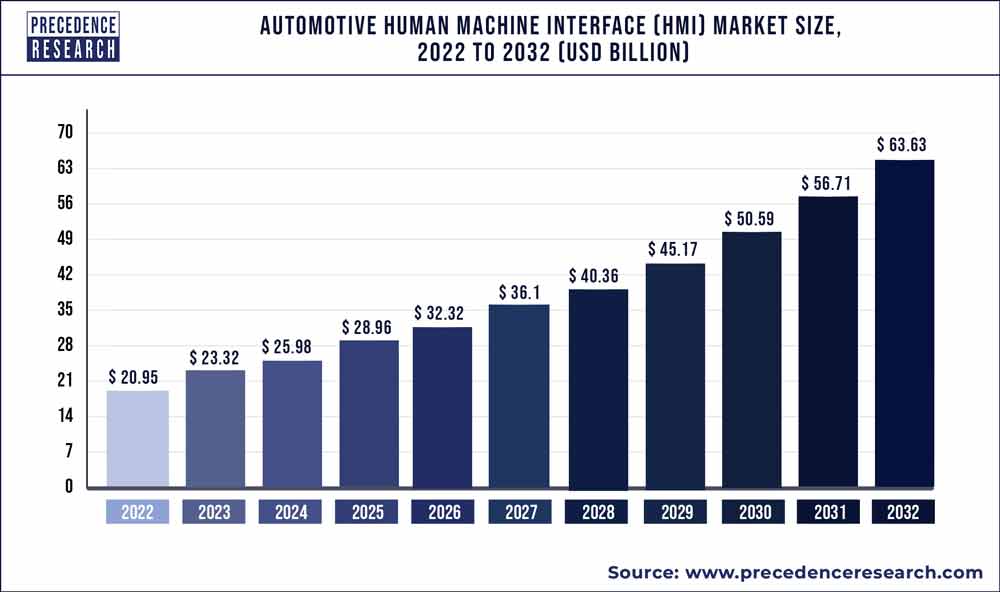The global automotive human-machine interface (HMI) market was valued at USD 23.32 billion in 2023 and is expected to hit over USD 63.63 billion by 2032, at a CAGR of 11.8% from 2023 to 2032.

Key Points
- North America led the global market with the highest market share of 38% in 2022.
- By Technology, the visual segment has held the largest market share in 2022.
- By Technology, the acoustic segment is expected to grow at a remarkable CAGR during the forecast period.
- By Product Type, the instrument cluster segment captured the biggest revenue share in 2022.
- By Product Type, the heads-up display (HUD) segment is expected to expand at the fastest CAGR over the projected period.
- By Vehicle Type, the passenger vehicle segment is estimated to hold the highest market share of 75% in 2022.
The Automotive Human Machine Interface (HMI) market is witnessing significant growth driven by advancements in technology, increasing consumer demand for connected vehicles, and a focus on enhancing the driving experience. HMI systems play a crucial role in facilitating interaction between drivers and vehicles, encompassing interfaces such as touchscreens, voice recognition, gesture control, and augmented reality displays. This market analysis explores the factors influencing the growth of the automotive HMI market globally.
Get a Sample: https://www.precedenceresearch.com/sample/1420
Growth Factors:
The automotive HMI market is experiencing robust growth due to several factors. Technological innovations, such as the integration of artificial intelligence and machine learning, are enhancing the capabilities of HMI systems, making them more intuitive and user-friendly. Additionally, the proliferation of electric vehicles (EVs) and autonomous driving technologies is driving demand for advanced HMI solutions to support the evolving needs of drivers and passengers. Moreover, the increasing focus on safety and convenience features in vehicles is fueling the adoption of HMI systems that enable hands-free operation and seamless connectivity.
Region Insights:
Different regions exhibit varying levels of adoption and growth in the automotive HMI market. Developed regions such as North America and Europe have been early adopters of advanced HMI technologies, driven by the presence of leading automotive manufacturers and a strong focus on innovation. Meanwhile, emerging markets in Asia-Pacific, particularly China and India, are witnessing rapid growth fueled by increasing vehicle production, rising disposable incomes, and government initiatives promoting automotive technology adoption.
Automotive Human Machine Interface Market Scope
| Report Coverage | Details |
| Growth Rate from 2023 to 2032 | CAGR of 11.8% |
| Market Size In 2023 | USD 23.32 Billion |
| Market Size by 2032 | USD 63.63 Billion |
| Largest Market | North America |
| Fastest Growing Market | Asia Pacific |
| Base Year | 2022 |
| Forecast Period | 2023 to 2032 |
Drivers:
Key drivers of growth in the automotive HMI market include the demand for connected and autonomous vehicles, consumer preference for enhanced user experiences, and regulatory mandates promoting vehicle safety and emissions reduction. Moreover, the growing integration of smart devices and digital services into vehicles is driving the need for advanced HMI systems capable of seamless connectivity and interoperability. Additionally, the shift towards electric vehicles is creating opportunities for HMI solutions that optimize energy management and provide real-time feedback to drivers.
Opportunities:
The automotive HMI market offers numerous opportunities for innovation and growth. With the ongoing development of connected and autonomous vehicles, there is a growing demand for HMI solutions that enable intuitive interaction and customization. Moreover, the rise of electric and hybrid vehicles presents opportunities for HMI systems to provide real-time feedback on energy consumption, battery status, and charging infrastructure. Furthermore, the integration of biometric sensors and advanced driver monitoring systems in HMI interfaces opens up possibilities for personalized and adaptive user experiences.
Challenges:
Despite the opportunities, the automotive HMI market faces several challenges, including interoperability issues, cybersecurity concerns, and regulatory complexities. Ensuring seamless integration and compatibility across different vehicle platforms and operating systems remains a challenge for HMI developers. Moreover, safeguarding HMI systems against cyber threats and unauthorized access is critical to maintaining vehicle security and user trust. Additionally, navigating the regulatory landscape, which varies across regions and jurisdictions, requires careful compliance and adaptation to standards related to vehicle safety, emissions, and data privacy.
Read Also: Vacation Rental Market Size, Growth, Share, Forecast By 2032
Automotive Human Machine Interface (HMI) Market Players
- Bosch Inc.
- Denso Corporation
- Continental AG
- Alpine Electronics Inc.
- Panasonic Corporation
- Visteon Corporation
- Nuance Communications Inc.
- Clariaon Co. Ltd
- Harman
- Samsung Electronics Co. Ltd
Segments Covered in the Report
By Technology
- Visual
- Acoustic
By Product Type
- Voice Control
- Central Display
- Instrument Cluster
- Steering Mounted Control
- Rear-seat Entertainment (RSE) Display
- Heads-up Display (HUD)
By Vehicle Type
- Passenger Vehicle
- Commercial Vehicle
By Geography
- North America
- U.S.
- Canada
- Europe
- U.K.
- Germany
- France
- Asia-Pacific
- China
- India
- Japan
- South Korea
- Rest of the World
Contact Us:
Mr. Alex
Sales Manager
Call: +1 9197 992 333
Email: sales@precedenceresearch.com
Web: https://www.precedenceresearch.com
Blog: https://www.expresswebwire.com/
